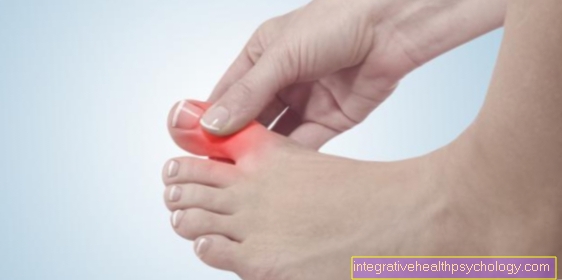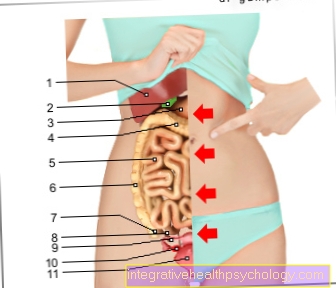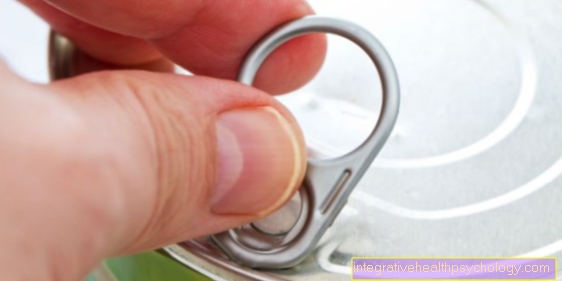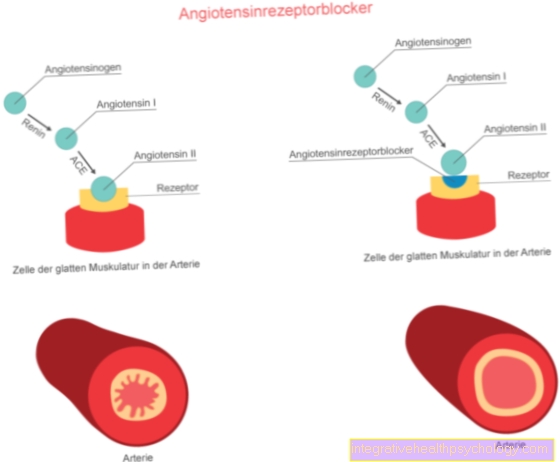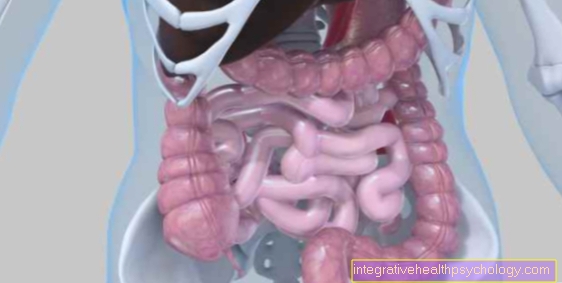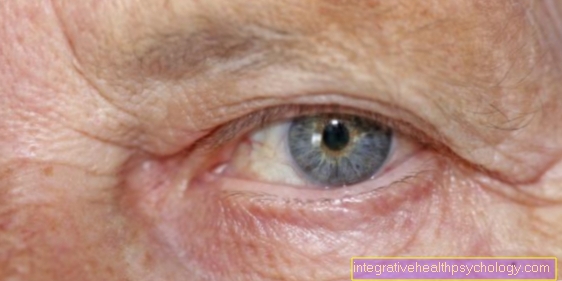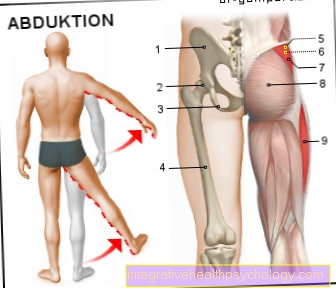Depression after a breakup
introduction
Breaking up with a partner is a major turning point in emotional wellbeing for many people. The separation is a particularly stressful situation, especially after longstanding relationships. Sadness is a normal reaction to such an event, but where is the line between sadness and depression? When should I seek help and where can I get it? All of these questions are answered in the following article.
How do I know if I suffer from depression after a breakup and not just from "normal" breakup pain?
Often the transition between separation pain and depression is fluid, so that the diagnosis of depression is difficult to make. The time component is particularly important in this context. One speaks of clinical depression only after the emotional upset has lasted for at least two weeks. The classic separation pain has mostly subsided after this period.
There are diagnostic criteria for depression that have been established by the WHO (World Health Organization). A distinction is made between main and secondary criteria, which are taken into account for the diagnosis. The main criteria include:
-
Gloomy mood
-
Listlessness
-
Loss of interest and joylessness
If at least two of these main symptoms persist for at least two weeks, this is considered an indication of a depressive episode. In addition, the WHO takes the following seven secondary criteria into account:
-
decreased ability to concentrate and attention disorders
-
decreased self-worth
-
Feelings of inferiority and guilt
-
Helplessness and hopelessness
-
Thoughts or acts of suicide
-
sleep disorders
-
decreased appetite
If at least two of the secondary symptoms exist in addition to two main symptoms for at least two weeks, it is referred to as mild depression. If there are three main symptoms and at least five secondary criteria, a diagnosis of severe depression can be made, which in principle is an indication for inpatient treatment. It is often difficult for those affected to differentiate whether the symptoms are correct or not. This is because people with a depressive mood have a disturbed self-perception and therefore cannot make a reliable self-diagnosis. For this reason, it is particularly important to go to the family doctor or outpatient psychiatrist if you suspect a depressive illness.
For more information, see the following article: Signs of Depression
Which accompanying symptoms can occur?
In addition to the symptoms mentioned above, which mainly relate to the psyche, there may be physical symptoms, but these are caused by the depression. Depressed patients can react with both increased and decreased food intake. This results in either weight gain or weight loss. In addition, patients often report disturbed sleep. A distinction is made between falling asleep and sleeping through the night. People with depression have trouble falling asleep and wake up early the next morning, so they rarely feel well rested. Furthermore, if you are depressed, irregular bowel movements and urination can occur. Both constipation and diarrhea are possible. Also not to be underestimated is the loss of sexual interest and sexual functionality, which men in particular find particularly agonizing.
For more information, see the following article: Symptoms of Depression
Listlessness
Loss of drive is one of the main symptoms of depression and is accordingly common in affected patients. In general, listlessness is the inability to motivate oneself to various activities. In severely depressed people, this goes so far that they can no longer cope with their everyday lives and, for example, are no longer able to get enough food or to follow their personal hygiene.
fatigue
Fatigue in depressed patients often results from disturbed sleep. On the one hand, the patients find it difficult to fall asleep, on the other hand they suffer from early waking. This means waking up prematurely more than two hours before the usual time to get up. Both of these lead to patients getting too little sleep and therefore not feeling sufficiently rested in the morning. As a result, patients quickly get into a vicious circle, as they now spend a lot of time in bed during the day to make up for their nightly sleep deficit. This leads both to a disturbed day-night rhythm, which in turn worsens night sleep, and to increasing social isolation.
You might also be interested in this article: Fatigue with insomnia
sadness
Depressed mood and sadness are core symptoms of depression. Affected people find it difficult to have positive thoughts and thus lose themselves in their sadness. Often times, patients' thoughts are only about negative emotions and they are prone to brooding. The bad mood is perceived by the patients as very uncomfortable and thus represents the largest part of the suffering.
What are the causes of depression after a breakup?
How every single person deals with a breakup is very individual. Some overcome the low mood after a few days, others need several weeks. This is related, for example, to personality and social environment. People with stable self-esteem and high levels of social contact are less likely to develop true depression. This contrasts with people with low self-esteem and an unstable social environment, who subsequently develop depression more often. Another risk factor is the excessive consumption of alcohol or other drugs such as cannabis. Negative emotions, such as those that occur after a breakup, tempt patients with substance abuse tendencies to consume. This markedly increased the likelihood of developing depression and should therefore be avoided.
You can find more information on the subject here: Causes of Depression
How do I deal with my ex-partner getting depression after a breakup?
Breakups are rarely a two-way decision. One partner makes the decision not to want to live with the other anymore, the other has to accept this decision. The separation is particularly difficult for the abandoned partner and he is more prone to developing depression. But how should I, as an ex-partner, deal with it?
It is important not to give the ex-partner false hopes for a reconciliation if that is not in their own interest. For the process of dealing with the abandoned, it plays a major role that the separation is a final decision. At the same time, you should also pay attention to your own psychological well-being. If you deal too much with the thought of being responsible for the depression of a former loved one, it can quickly make you sick yourself. Certainly one is plagued by feelings of guilt in such a situation, but it is important to remember that the choice of partner is in your own hands. Resuming a relationship out of pity is not a sensible idea.
Overall, the contact between the ex-partners should be limited to the minimum in order to allow the abandoned person as much space and distance as possible. If you still want to help, it might be a good step to share your concerns with the friends and family of your ex-partner. They can then better deal with the depression of the abandoned person. If there is a concrete suspicion that the ex-partner is considering suicidal acts, the police should be informed in order to prevent worse.
You may also be interested in this article: My partner has depression - how do I best deal with it?
How can I overcome depression after a breakup?
The separation from a partner can be perceived as very stressful. In the hours and days immediately after the breakup, the negative feelings are usually strongest. But it is important to allow this. They are completely normal and are part of the manufacturing process. It is especially important not to try to numb these feelings with alcohol or other drugs. In the vast majority of cases, this only creates new problems.
How exactly the individual deals with a breakup is very different. For some it helps a lot to do things with friends or family to distract themselves, others like to stay to themselves or travel. In any case, it makes sense to distract yourself from negative emotions and at the same time rebuild self-esteem through activities. It is important not to put too much pressure on yourself and to give yourself enough time to process the breakup.
In addition, the personal attitude towards the ex-partner should be reconsidered. After a long-term relationship and subsequent separation, the abandoned part often tends to "put the ex-partner on a throne". This makes it seem impossible to ever find a new partner who can approach the ex-partner. However, this is a misjudgment. On the one hand, this simply does not correspond to reality, on the other hand, it hinders the future partner search.
If the sadness has not gone away or has gotten worse after several weeks, you should consider seeking professional help. Especially when it comes to suicidal thoughts, you should not let yourself be guided by a false sense of shame and consult a doctor. It is sufficient to ask your family doctor for help at first. Mild and moderate depression can be easily treated in an outpatient setting, while inpatient treatment can be useful for severe depression.
You can find additional information here: Therapy for Depression
How long does depression last after a breakup?
It is not possible to predict the duration of depression after a breakup, as it depends on many different and individual factors. The psychological condition of the person concerned and their social environment play the greatest role. In addition, self-worth and personality in general determine the duration. Patients with a stable personality and a stable social environment find it easier to deal with depression, so that the depression can subside after a few weeks. Patients to whom this does not apply often have to deal with the disease for longer. In the case of severe depression, an inpatient stay can follow, which can take a few weeks. In summary, it is important to react promptly and seek help in order to keep the duration of the depression as short as possible.


